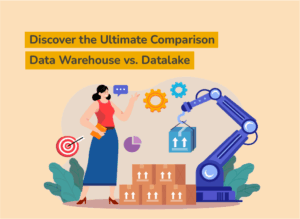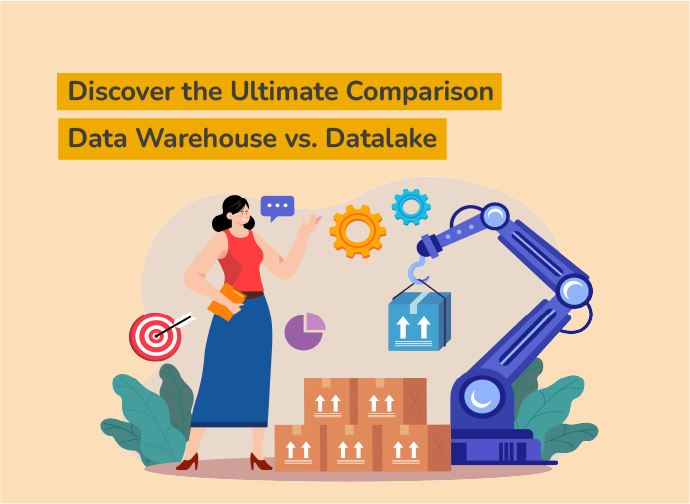What is data management in the context of orchestration?
Data management in the context of
orchestration involves the systematic organization, storage, and retrieval of data across diverse systems. Orchestration plays a critical role by coordinating data flows,
integrating different processes, and ensuring seamless data movement. It harmonizes disparate systems, promoting better
data governance and enhancing overall operational efficiency. This approach enables organizations to manage complex datasets with ease, ensuring data is consistently accessible and
reliable.
Key Takeaways
- Data management in orchestration is about organizing, storing, and retrieving data efficiently across diverse systems.
- Orchestration solutions are vital for enhancing data accuracy and consistency, reducing manual errors significantly.
- By automating workflows, orchestration improves data handling efficiency, optimizing resource allocation for better operational performance.
- Integrating orchestration solutions with existing systems may present challenges but is essential for effective data management.
- Businesses adopting orchestration solutions can achieve cost savings and make better data-driven decisions.
Definition of data management
Data management refers to the entire practice of collecting, organizing, and maintaining data processes to ensure efficiency and accessibility. In the context of orchestration, it involves coordinating complex interdependencies in workflows to streamline information flow across tools and platforms. Orchestration enhances data management by automating processes, reducing manual interventions, and enabling seamless integration, creating a robust framework for efficient data handling across varied business environments.
Role of orchestration in data management
In the realm of data management, the role of orchestration is pivotal. Orchestration solutions automate and streamline complex data workflows, enabling organizations to enhance control and improve data consistency. By ensuring seamless integration between various data sources and systems, orchestration not only reduces manual intervention but also boosts efficiency and data accuracy, offering a scalable solution to meet evolving business demands.
Why are orchestration solutions essential for data management?
Orchestration solutions are
crucial in data management as they significantly improve data
accuracy and ensure consistent data flows. By automating processes, these solutions reduce
manual errors, thereby enhancing overall
efficiency in handling data. Moreover, orchestration provides a streamlined approach to managing data by
optimizing resource allocation, which is vital for maintaining seamless operations in today’s data-driven environments. Consequently, businesses can achieve better outcomes through enhanced accuracy, consistency, and resource management.
| Key Benefits of Orchestration Solutions |
| Improved Data Accuracy |
| Ensured Data Consistency |
| Enhanced Efficiency |
| Reduced Manual Errors |
Improving data accuracy
Improving data accuracy is pivotal in any modern business environment. Data orchestration solutions play a critical role by automating complex processes, drastically reducing discrepancies through streamlined workflows. These solutions ensure that data handling is precise and consistent, enhancing the reliability of data across multiple platforms. As a result, businesses can make informed decisions with confidence, backed by high-quality, accurate data that reflects true insights.
„Improving data accuracy is crucial for businesses to maintain competitive advantage and operational efficiency.“
Ensuring data consistency
Ensuring data consistency is vital in modern data management to maintain accuracy across systems and processes. Orchestration solutions play a crucial role by synchronizing data flow, reducing discrepancies, and enhancing the reliability of data assets. They enable real-time updates and seamless integration between diverse databases and applications, which significantly improve organizational data integrity and trustworthiness.
Enhancing efficiency in data handling
Efficiency in data handling is crucial for businesses that aim to stay competitive in today’s digital landscape. Orchestration solutions play a pivotal role in achieving this by automating repetitive tasks, minimizing manual errors, and improving overall process efficiency. These solutions enable businesses to allocate resources more effectively, thereby enhancing productivity and ensuring seamless operations. By adopting orchestration solutions, companies can streamline their data workflows and bolster their capacity to make data-driven decisions swiftly and accurately.
How do orchestration solutions streamline data workflows?
Orchestration solutions play a crucial role in streamlining data workflows, effectively transforming how businesses manage their data processes. By
automating data processes, these solutions help reduce manual errors, thereby enhancing the accuracy and reliability of data handling. Additionally, orchestration facilitates the optimization of resource allocation, ensuring that computational and human resources are effectively utilized, which significantly boosts operational efficiency.
Automating data processes
Automating data processes is a transformative approach that leverages orchestration solutions to streamline and enhance data management. By integrating
automation, businesses can minimize
manual errors and boost efficiency in handling data-intensive tasks.
Orchestration solutions manage these processes seamlessly, ensuring consistent data flow and optimized resource allocation. This automation not only accelerates workflow but also fosters greater accuracy and reliability in data handling, indispensably enhancing overall operational effectiveness.
Reducing manual errors
Reducing manual errors in
data management is pivotal for boosting
operational efficiency and maintaining data integrity.
Orchestration solutions play a critical role by automating repetitive tasks and minimizing the risk of human error. These solutions streamline
data workflows, ensuring high
accuracy and
consistency. By embracing advanced orchestration, businesses can focus more on strategic objectives and less on error correction, driving overall productivity and
organizational growth.
Optimizing resource allocation
Optimizing resource allocation is pivotal in effective data management, especially with the adoption of orchestration solutions. These solutions ensure that resources are not just utilized but maximized by automating tasks and reducing the need for manual intervention. This optimization not only streamlines operations but also facilitates better decision-making, leading to enhanced productivity and significant cost savings for businesses.
What are the key features of effective orchestration solutions?
Effective orchestration solutions boast key features that drive seamless data management. Integration capabilities ensure systems work in harmony, while scalability allows businesses to handle growing data volumes effortlessly. Flexibility in operations enables customization to meet specific organizational needs. These features not only enhance efficiency but also optimize performance, catalyzing innovation and growth. Selecting the right solution tailored to these features empowers businesses to thrive in a competitive landscape.
Integration capabilities
Effective orchestration solutions boast
integration capabilities that enable seamless connection of diverse systems and applications, allowing data to flow effortlessly across platforms. This ensures
data consistency and
accuracy, crucial for maintaining reliable business operations. By automating workflows, these solutions remove data silos, fostering more efficient communication and
resource optimization. Additionally, the ability to integrate with legacy systems can significantly ease the transition, reducing operational disruptiveness and promoting
overall business efficiency.
Scalability
Scalability is a crucial element in choosing an orchestration solution for effective data management. A solution that seamlessly scales ensures
growing data volumes and evolving business needs are met without compromising performance. It accommodates fluctuating resource demands, enabling organizations to handle
peak workloads efficiently. This flexibility supports long-term growth and allows companies to adapt to market changes swiftly. Selecting a scalable orchestration solution means future-proofing your data management strategy while optimizing operational efficiency.
- Meets expanding data volumes and business needs
- Handles peak workloads effectively
- Supports long-term growth
- Facilitates adaptability to market changes
Flexibility in operations
Flexibility in operations is a hallmark of effective
orchestration solutions, enabling businesses to seamlessly adapt to varying
data management needs. This
flexibility allows organizations to tailor workflows, adjust resources, and scale processes efficiently, ensuring optimal performance. With customizable operations, businesses can respond swiftly to evolving demands, mitigating risks and capturing opportunities, while maintaining
data quality and consistency within an ever-changing environment. This dynamic adaptability is essential in today’s fast-paced digital landscape.
How can businesses benefit from adopting orchestration solutions?
Adopting orchestration solutions offers
cost savings,
improved decision-making, and heightened
compliance and
security for businesses. By automating routine tasks and streamlining data workflows, companies can significantly reduce operational costs. Access to accurate and timely data enhances decision-making capabilities, enabling more strategic choices. Furthermore, implementing orchestration solutions strengthens data protection measures, ensuring regulatory compliance and safeguarding sensitive information against potential breaches.
Cost savings
Orchestration solutions play a vital role in achieving significant cost savings for businesses managing large volumes of data. By automating routine tasks, these solutions minimize the need for manual intervention, leading to reduced labor costs. Furthermore, enhanced efficiency in data workflows results in optimal resource utilization, maximizing ROI and contributing to a leaner operational structure. Thus, investing in the right orchestration technology can transform data management into a more economical endeavor.
Improved decision-making
Incorporating orchestration solutions into your data management strategy can significantly enhance decision-making processes. These solutions ensure data consistency and accuracy, which are fundamental for reliable analytics. By streamlining data workflows and reducing human errors, orchestration tools provide businesses with up-to-date information, fostering quicker and more informed decisions. Moreover, by optimizing resource allocation and ensuring seamless integration, organizations can drive data-driven strategies more effectively.
Enhanced compliance and security
Orchestration solutions play a critical role in bolstering
compliance and
security in data management. They provide tools that ensure data
integrity and adherence to regulatory standards across all operations. By automating routine controls and
monitoring activities, these solutions minimize the risk of
data breaches and enable businesses to maintain strict compliance without additional manual oversight. This confidence in data
protection translates into trust and reliability for stakeholders.
What challenges might arise with orchestration solutions in data management?
Implementing orchestration solutions in data management presents several challenges. One major issue is integrating these solutions with existing systems, which may require significant effort and time. Managing organizational change is another hurdle, as it demands adapting workflows and retraining staff. Additionally, ensuring consistent data quality remains a challenge, as orchestrated environments must prevent data corruption and maintain accuracy.
| Challenge |
Impact on Data Management |
| System integration |
Requires effort and time |
| Organizational change |
Need for workflow adaptation |
| Data quality |
Prevents data corruption |
Integration with existing systems
Integrating
orchestration solutions with existing
systems can pose challenges, yet it is crucial for effective
data management. Compatibility issues often arise, requiring careful
planning and a strategic approach to maintain seamless operation. Businesses must evaluate current
infrastructure to ensure that the orchestration tools can enhance productivity without disrupting ongoing processes. This assessment safeguards against potential
integration headaches, enabling smoother transitions and maximized
efficiency in data handling.
Managing change within organizations
Navigating organizational change when integrating
orchestration solutions is critical for
data management success. Organizations often face challenges such as
adapting existing workflows and ensuring team alignment. A strategic approach can mitigate resistance and facilitate smoother transitions.
Leadership engagement, regular communication, and training are essential in overcoming these hurdles and reaping the benefits of enhanced data management processes.
Ensuring data quality
Ensuring data quality is paramount in maintaining effective data management systems, especially in the context of orchestration solutions. These solutions help minimize inconsistencies and errors, ensuring that data remains reliable across platforms. By automating workflows, they significantly reduce manual interventions, allowing businesses to maintain high data standards. Implementing robust orchestration strategies ensures that data is not only accurate but also easily accessible, facilitating better decision-making.
How to choose the right orchestration solution for your business?
Selecting the right orchestration solution for your business requires a comprehensive evaluation. Start by
assessing your business needs to ensure a suitable fit. Evaluate different vendors by analyzing their features and checking
compatibility with existing systems. Consider budget constraints to ensure the solution is cost-effective. Prioritize solutions offering
integration capabilities, scalability, and flexibility. A well-chosen orchestration tool can streamline processes and drive operational efficiency.
Assessing business needs
Assessing business needs is crucial when selecting an orchestration solution. Begin by identifying specific data management goals and key areas requiring enhancement. Consider the alignment with strategic objectives and evaluate the compatibility with existing infrastructure. Leverage comprehensive needs assessment to ensure the selected solution caters to both current and future requirements, ultimately simplifying workflows and enhancing operational efficiency.
Evaluating different vendors
When it comes to selecting the perfect orchestration solution for your business, evaluating different vendors is crucial. It’s important to consider factors such as the vendor’s
reputation, the
versatility of their solutions, and their
support services. Look for vendors who offer robust
integration capabilities, excellent
scalability, and a proven track record in delivering
results. Thorough evaluation will ensure that your chosen solution aligns with your business’s unique needs, facilitating seamless data management operations.
Considering budget constraints
When choosing
orchestration solutions for
data management, it’s crucial to consider budget constraints without compromising on key features. Balancing costs with the effectiveness of integration,
scalability, and
flexibility is essential. It’s advisable to evaluate different vendors to find a solution that aligns best with your budget and organizational needs, potentially leading to substantial
cost savings and enhanced
efficiency in operations.
FAQ
What is data management in orchestration?
Data management in the context of orchestration involves organizing, storing, and retrieving data systematically across systems, ensuring seamless data movement and enhancing operational efficiency.
Why are orchestration solutions essential for data management?
Orchestration solutions are crucial because they improve data accuracy, reduce manual errors, and offer optimized resource allocation, ensuring seamless operations in data-driven environments.
How does orchestration improve data accuracy?
Orchestration solutions automate complex processes, which reduces discrepancies and enhances the reliability of data, aiding businesses in making informed, data-driven decisions.
What are the challenges of using orchestration solutions?
Challenges include system integration, managing change within organizations, and ensuring consistent data quality.
How can businesses benefit from adopting orchestration solutions?
Adopting orchestration solutions offers cost savings, improved decision-making, and increased compliance and security.
What features should an effective orchestration solution have?
Effective orchestration solutions should have integration capabilities, scalability, and flexibility to adapt to varying business needs.
How do orchestration solutions streamline data workflows?
Orchestration solutions automate data processes, enhancing the accuracy and reliability of data handling, and optimize resource allocation to boost operational efficiency.









